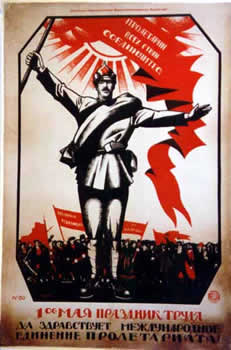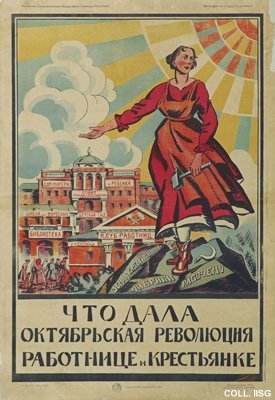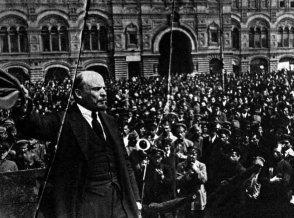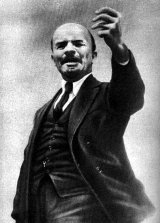The Russian Revolution
The Russian Revolution was the most important revolution of the 20th century, and was one of the most important revolutions in the history of the world. I would place it as the third most important revolution after the American and French Revolutions. Like the American Revolution, and most other revolutions, the Russian Revolution was a revolution against economic oppression. In addition to this, the Russian Revolution started out as a revolution for democracy. |  |
Basically Russia came into the 20th century as an extremely oppressed country that was ruled by the Czars. Russia was a feudal dictatorship. The people of Russia were horribly oppressed, poor, starving, cold, and without any real direction or hope. Essentially, Russia had never undergone the liberal revolutions that took place in Europe (starting with the French Revolution), which had established liberal democracy and capitalism there. Russia remained as one of the last vestiges of Medieval European society.
Through acts of “terrorism” and rebellion a small group of revolutionaries overthrew the Czars. Then Russia went into a stage of anarchy and turmoil, out of which the Bolshevik Party of Lenin emerged as the dominant political force.
Lenin and many of the Bolsheviks were not in Russia at the time of the Revolution. Some of them were from Russia originally but had left, while some were not from Russia at all. They were all Marxists and socialist revolutionaries that had been living in Europe studying science, economics, sociology, history, etc. from a Marxist perspective. The Bolsheviks did not cause the overthrow of the Russian government; they came in after the overthrow with the plan of putting Marxist revolutionary theory to practice. Their plan from the beginning was to develop Russia in such a way as to spread social revolution throughout Europe and eventually the world. The biggest political opponents of the Bolsheviks in Russia, aside from the Czars, were the Mensheviks and Social Democrats, both Marxist groups who also supported Socialism, but were less militant. What is important to understand about the Russian Revolution is that some of the biggest opponents to the Bolsheviks were other Communists. The "brand" of Communism that was promoted by the Bolsheviks was by no means representative of all Communist ideology. Bolshevik ideology was the least tolerant and most revolutionary form of Marxist ideology.
 |  |
The Constitution of the U.S.S.R.:
http://www.marxists.org/history/ussr/government/constitution/1918/index.htm
In addition to launching an attack on private property they did something else that upset countries around the world, and that was to make public all of the secret information that was contained in the Russian government files. They exposed all of the secret treaties that the Russian Czars had made with various countries as well as other information that the Russian government had acquired through its own intelligence operations. They did this because they felt that humanity should progress through honesty and they wanted to expose the corruption of other capitalists countries as well as of the old Russian regime.
These actions only added to the international opposition to the situation in Russia. After World War I was over 21 countries from all over the world, including America, began supporting a counter-revolution in Russia in an attempt to stop the Bolshevik revolution. At this time Russia entered a stage of Civil War between the Reds and the Whites.

In 1918 American President Woodrow Wilson sent 12,000 American troops to Russia to fight on the side of the Czars against the Red Army. Interestingly, the American forces in Russia suffered more attacks and problems from the White Army than from the Red Army. The American commanders in the field reported that the Czarist reign of terror was far more horrific and disturbing that the actions of the Reds. The American forces also discovered that the vast majority of Russians sympathized with the Bolsheviks and supported the revolution. In the end, the American troops were brought home without any fanfare, and the ordeal was considered one of the most ill-conceived interventions in American history up to that time. Major General Graves, who lead the expedition, was accused of being a "Red sympathizer" and was generally disgraced after the event.
For more on this see:
http://www.ocnus.net/cgi-bin/exec/view.cgi?archive=38&num=9699
Two distinct views emerged from the Russian revolutionaries.
One was that Russia was incapable of undergoing a socialist revolution and that according to Marxist theory Russia would first have to establish a capitalist system to develop its economy. During the time that Russia was developing its capitalist economy it was intended that socialist revolutionaries should attempt to promote socialist revolution in developed countries, particularly in developed Europe such as France and Germany, and America as well, which would all be supported by the Russia government.
The opposing view to this was that a socialist state should be forced upon Russia and that Russia should lead the world by example in the matter of socialism. Stalin was a major supporter of this idea of "national socialism", which was contrary to the views of many of the Bolsheviks, including Lenin and Trotsky, two of the major figures in the Bolshevik Revolution.
The Marxist theory of socialism stated that socialism would not be possible to support in a single country, but that socialism required a global revolution so that all countries could work together through the use of shared resources and shared labor in order to provide enough goods to satisfy the demands of all people. The revolutionaries were genuine in their desire to attempt to bring about this condition, which is why they made certain that Russia was to have a strong policy against imperialism. They felt that in order for a true social revolution to take place it would have to be won through education of the people not through the force of war.
In 1918 Lenin was shot by a female Russian Socialist, Fanya Kaplan, who believed that Lenin had betrayed the Revolution and was not promoting Socialism.
In 1921 the Soviet Congress voted to institute a "New Economic Policy", known as the NEP. Lenin was highly influential in the development of the NEP, which was largely a concession to capitalists and property owners. The NEP allowed for the development of a free-market system and privatized production.
As Lenin’s health declined Stalin, as General Secretary, took increasing control over the party and at that time the democratic and open nature of the Russian system began to slip away. Stalin began removing his political opponents from the soviets and took on an authoritarian position. Lenin tried to get the cooperation of Leon Trotsky to oppose Stalin but it was too late, Stalin had already consolidated too much power. Prior to his death, Lenin not only warned against the leadership of Stalin, but he also urged that the Soviet system become more open and democratic.

I think that the fundamental factor in the matter of stability—from this point of view—is such members of the Central Committee as Stalin and Trotsky. The relation between them constitutes, in my opinion, a big half of the danger of that split, which might be avoided, and the avoidance of which might be promoted, in my opinion, by raising the number of members of the Central Committee to fifty or one hundred.
Comrade Stalin, having become General Secretary, has concentrated an enormous power in his hands; and I am not sure that he always knows how to use that power with sufficient caution. On the other hand, Comrade Trotsky, as was proved by his struggle against the Central Committee in connection with the question of the People’s Commissariat of Ways and Communications, is distinguished not only by his exceptional abilities—personally he is, to be sure, the most able man in the present Central Committee—but also by his too far-reaching self-confidence and a disposition to be too much attracted by the purely administrative side of affairs.
These two qualities of the two most able leaders of the present Central Committee might, quite innocently, lead to a split; if our party does not take measures to prevent it, a split might arise unexpectedly.
- Lenin 1922
No hay comentarios:
Publicar un comentario
Nota: solo los miembros de este blog pueden publicar comentarios.